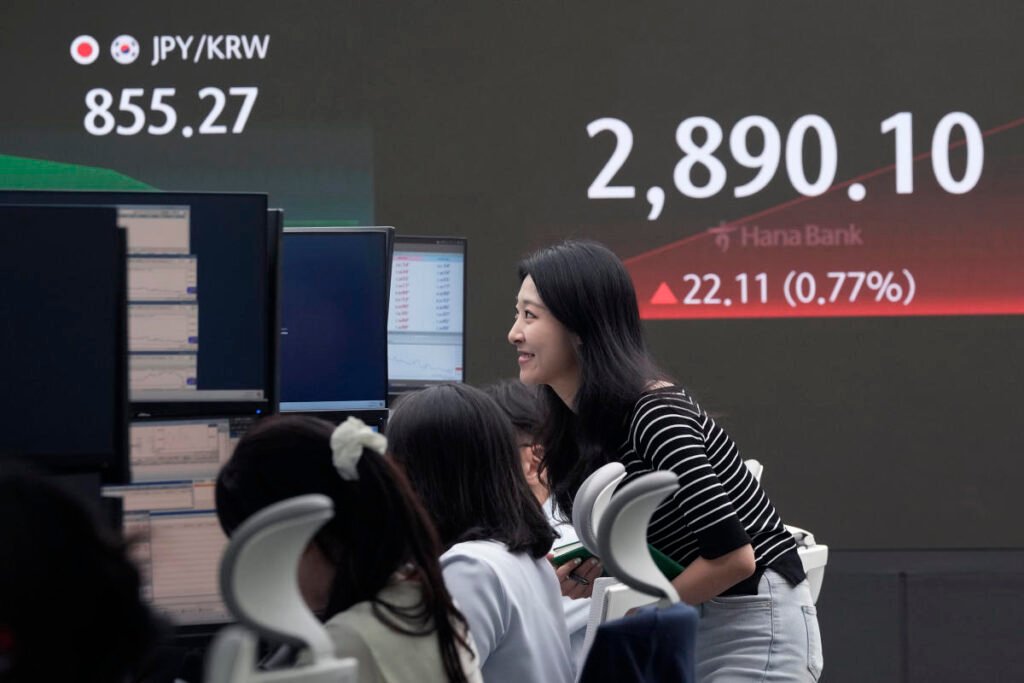Asian shares rose on Thursday, following a surge on Wall Street, while Japan’s Nikkei average surpassed 42,000 points for the first time.
The U.S. stock market hit a new record high on Wednesday, led by big technology companies whose shares are soaring on the craze for artificial intelligence.
Hopes of interest rate cuts also boosted the market.
The Nikkei stock average rose 0.8% to 42,179.84, again surpassing its all-time high after closing at record highs on Tuesday and Wednesday.
Hong Kong’s Hang Seng Index rose 1.1% to 17,667.58.
The Shanghai Composite Index rose 0.7% to 2,959.25, while the Seoul Composite Index rose 0.8% to 2,891.34.
Australia’s S&P/ASX 200 rose 1% to 7,894.30. Taiwan’s Taiex rose 1.1% and Taiwan Semiconductor Manufacturing Co. added 2.4%.
TSMC’s U.S.-listed shares rose 3.5% after the company said its June sales rose about 33% from a year earlier. The company makes chips for companies such as Nvidia that have led the business world’s rapid move into artificial intelligence technology.
Hopes of big future gains from AI have propelled Nvidia in particular to extraordinary heights over the past year, with the stock up another 2.7% on Wednesday for a 172.5% gain so far this year. Nvidia was again the most powerful single driver lifting the S&P 500 as Wall Street extended its rally to a seventh day, led by big tech companies.
The S&P 500 rose 1%, surpassing the 5,600 level for the first time, closing at 5,633.91.
The Nasdaq Composite Index rose 1.2% to 18,647.45, while the Dow Jones Industrial Average rose 1.1% to
Advanced Micro Devices was another big driver of the stock market surge, with its shares rising 3.9% after it announced a deal to acquire European AI research lab Silo AI for $665 million.
Despite a slowing U.S. economy and severe pressures on low-income households, markets continue to set new records.
Expectations that inflation will slow enough to allow the Federal Reserve to deliver a much-needed interest rate cut later this year are also spurring buying.
Federal Reserve Chairman Jerome Powell returned to Capitol Hill to testify about interest rates, repeating many of his comments from the previous day. He said the central bank was “not sending any signal” about when interest rates would be cut, but noted the drawbacks of cutting rates too late.
“As we get more and better data, our confidence will increase,” paving the way for rate cuts, Powell said.
Many on Wall Street expect the Fed to start cutting its key interest rate in September, but traders have long had a tendency to get ahead of themselves. Chairman Powell acknowledged recent inflation improvements but reiterated that the Fed is not convinced inflation is sustainably moving toward its 2% target.
Later on Thursday, the U.S. government will release its latest monthly inflation numbers, and economists expect them to report that the prices American consumers paid for food, airfare and everything else rose 3.1% in June from a year earlier, slightly lower than May’s 3.3% inflation rate.
“With the Fed wanting to see ‘better data’, U.S. inflation figures will play a key role in testing whether markets are over-pricing a rate cut as early as September this year,” IG’s Yep Jun Rong said in a commentary.
Later this week also marks the unofficial start of the latest earnings reporting season, with Delta Air Lines, JPMorgan Chase and others set to announce how much profit they made in the April-June spring, and Wall Street hoping S&P 500 companies will post their first big gains in more than two years.
Meanwhile, benchmark U.S. crude rose 75 cents to $82.85 a barrel in electronic trading on the New York Mercantile Exchange.
Brent crude, the international standard, rose 79 cents to $85.87 a barrel.
The U.S. dollar fell to 161.60 yen from 161.66 yen. The euro rose to 1.0839 dollars from 1.0832 dollars.
___
AP Business Writer Stan Cho contributed.

